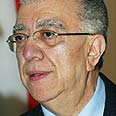
The late Antoine Ghanem
צילום: רויטרס
Lebanese MP's assassination unsurprising
As anti-Syrian lawmaker Ghanem's death brings his bloc's control of parliament to possible end, factional tensions in Lebanon expected to increase
Despite heavy security measures, Lebanese Parliament member Antoine Ghanem was assassinated Wednesday by a bomb that targeted his car in Beirut’s suburb of Sin el-Fil. Ghanem, like other anti-Syrian MPs, tended to switch his car, home location and even spend time abroad. In the end, it was to no avail. He could not escape the reality in Lebanon.
June 2005 shook the country so much that reverberations are still felt today. That month, after four rounds of elections, an anti-Syrian political bloc came to power in a definitive popular victory - 72 out of 128 seats in parliament.
The win came in the wake of a string of political assassinations: On October 1, 2004, a car bomb exploded next to the motorcade of Druze MP Marwan Hamadeh. He was severely injured and his driver was killed.
A massive explosion on February 14, 2005, killed former Lebanese Prime Minister Rafiq Hariri in Beirut. This last assassination was considered to be the driving force behind the anti-Syrian camp's victory. It was followed by assassination attempts on several anti-Syrian journalists.
Such assassination attempts have now become expected because of the geopolitical reality, or rather, geopolitical crisis in Lebanon: It's time to elect a new president. According to Article 49 of the Lebanese constitution, the president needs to be elected by a majority of at least 65 parliament members.
Up until Wednesday afternoon, the anti-Syrian camp had 65 MPs solidly affiliated with them, meaning they could determine the next president without consulting other political groups. Now, since they only have 64 assured votes, they will need to negotiate with rival parties, among them, Hizbullah.
According to Lebanese law, an MP who passes away or leaves parliament before his term is up does not cede his seat to another member in his party. Rather, he is replaced by the winner of new elections in his district, creating the possibility for a party change. Clearly, assassinations of anti-Syrian politicians
have the potential to erode the bloc's population gradually.
Indeed, assassination attempts have continued since the anti-Syrians' mid-2005 election. In December of that year, Gebran Tueni, a prominent anti-Syrian journalist and MP, was killed by a car bomb. Industry minister and Christian Maronite leader Pierre Gemayel was killed on November 21, 2006. MP Walid Eido, an anti-Syrian Sunni, was killed in a blast on June 13, 2006.
As a result of these three assassinations, the leading party lost one parliament seat to Michele Aoun's party.
Anti-Syrian bloc dwindling
But the anti-Syrian camp has been weakened in other ways. MP Mustafa Ali Hussein, originally affiliated with the camp, later declared himself an independent. In January 2006, Edmond Naim, member of the Lebanese Forces bloc of Samir Geagea in the parliament died of natural causes. He was replaced by Pierre Daccache, who is not a member of the anti-Syrian camp.Five parliament members within the anti-Syrian coalition, including Robert Ghanem who is poised to announce his candidacy for president and a group of four MPs from Tripoli, have threatened to leave the bloc. Their departure would bring the number of anti-Syrian votes to 64.
Unsurprisingly, given the dwindling number of anti-Syrian MPs, there is no leading contender at the current time strongly affiliated with any party. Lebanon’s army commander, General Michel Suleiman, appears to be a top choice as a compromise.
The implications of the current situation are clear – until mid-November when President Emile Lahoud's successor is determined, tensions can be expected to rise.










